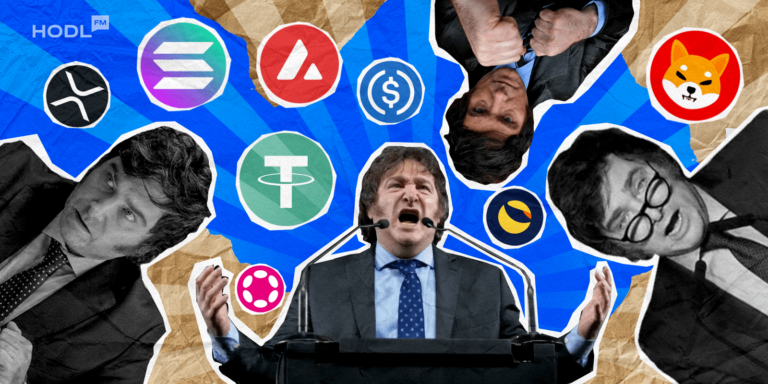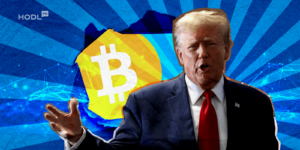Argentina politics has always managed to grab the attention of global public opinion. With the rise of Javier Milei, a new chapter has begun. A figure both controversial and charismatic, in an odd way, Milei’s ascent to the presidency is the signal of a massive political transformation in Argentina.
Enough with plain politics, what’s in for crypto users? Well, there are traces of an increasing influence of cryptocurrency in the region, but the spotlights are on something far crazier, like the complete dollarization of the entire Argentina economy. First, some background:
The 2023 Argentina elections clearly reflected the country’s desire for radical change. An economist and former TV pundit, Javier Milei emerged as a force to be reckoned with. His wild hair and unorthodox style seem to have captivated the new generation of voters. Milei’s far-right libertarian movement galvanized the young and the frustrated with a promise of a departure from traditional politics. Look at this victory: he secured 56% of the votes against his opponent’s 44%, which was not just a triumph of his political moves but also an indicator of Argentina’s thirst for a new direction.

Of course, the crazy hair and dances were not enough to get that many votes. Milei’s rise to power is mostly due to his unique appeal in Argentina’s complex political landscape. Known for his fiery rhetoric and harsh criticism of the political elite, he positioned himself as an anti-establishment figure, a rebel of sorts. His campaign featured acts like smashing a piñata of the central bank on live TV, resonating with the Argentinians who were sick of conventional political and economic rhetoric. The politics of Argentina is too large of a topic for us, so, let’s focus on their deeply rooted economic struggles, which also have a lot to do with crypto.
Economic Challenges in Argentina
Argentina is a country struggling with daunting economic challenges and now found itself at a critical juncture in its history. The nation’s economic landscape is long marred by hyperinflation and fiscal instability. The problems were so deep that in 2023 inflation soared to an alarming 142%. These economic challenges in Argentina have severely impacted the daily lives of its citizens. Surprise surprise, that much inflation created an urgent need for comprehensive economic reform.
The election of Javier Milei as president marks a pivotal moment in Argentina’s politics. Milei is a figure synonymous with libertarian economics and known for his radical fiscal policies. He proposed a fundamental shift in Argentina’s approach to its economic woes. His advocacy for economic liberalization is seen as a beacon of hope for a country in desperate need of stability and growth.
Milei’s political ideology includes the full dollarization of the Argentine economy. This bold– some may claim crazy, the strategy aims to replace the volatile Argentine peso with the US dollar. He literally considered the currency of a nation as what some of you may know as a shitcoin. Well, such policies are in line with Milei’s libertarian economics, which favors minimal government intervention in the economy.
In Argentina, where the economy is really unstable, more and more people are starting to use Bitcoin and other cryptocurrencies. It’s not because President Milei told them to, but because everyone is looking for new ways to fix old money problems. So, even though Milei didn’t make it a rule to use cryptocurrencies, a lot of people are choosing to use them anyway, hoping they’ll help with their financial troubles. Now, let’s go a bit deeper.
More Interesting News:
New Speaker in the House & What It Means for Digital Assets
Hong Kong’s Crypto Push: Attracting Mainland China’s Finest
Milei’s Stance on Cryptocurrency
Javier Milei brings a new and distinctive perspective to the discussion around cryptocurrency. He views Bitcoin and other cryptocurrencies not just as financial assets but as useful tools for economic liberation. His stance reflects a profound dissatisfaction with traditional financial institutions, particularly central banks, which he has famously criticized as being detrimental to economic stability. “The central bank is a scam,” Milei has declared. This can be interpreted as a positioning of Bitcoin, or other cryptocurrencies as a mechanism for returning monetary control to the private sector.
But let’s hold our horses for a bit. Despite his favorable view of Bitcoin, Milei has not advocated for its adoption as legal tender in Argentina. Instead, his approach leans towards a more centralized economic strategy, like the dollarization of the Argentine economy. This proposal is aimed at combatting the gargantuan inflation in the country and would replace the unstable Argentine peso with the US dollar as the official currency.
Milei’s perspective on cryptocurrency and his potential financial and political disruptions intersects intriguingly with his broader economic policies. His advocacy for Bitcoin seems to be more about embracing a decentralized, non-governmental approach to monetary policy rather than a full-fledged endorsement of cryptocurrencies as mainstream financial instruments. This nuanced position places Milei at the forefront of a potential shift in Argentina’s financial landscape, where cryptocurrencies might play a complementary role to traditional monetary systems.
Crypto Adoption in Argentina
In Argentina, the adoption of cryptocurrency is rapidly growing, as a way to gain financial freedom. Crypto in Argentina has gained traction as a seemingly more stable and reliable alternative to the national currency. Imagine how unstable the economy is. The increasing interest and adoption of cryptocurrencies like Bitcoin is a response to the hyperinflation and currency devaluation that have long plagued the Argentine economy.
The election of Javier Milei has had a noticeable impact on the crypto ecosystem in Argentina and of course, Argentina’s political future. Following his victory, there was a surge in the value of Bitcoin. Although he did not openly advocate BTC, Milei’s win is perceived as a potential catalyst for changes in cryptocurrency regulations and the broader financial system in Argentina. This trend points to a growing recognition of the potential of cryptocurrencies as tools for hedging against inflation and currency instability.
Milei’s impact on the political landscape might influence the future trajectory of cryptocurrency regulation in the country. There is a possibility that under his leadership, Argentina could see a more open and favorable environment for the adoption and use of cryptocurrencies. This could involve exploring cryptocurrencies as a super-sovereign currency and a store of value that offers resistance to inflation, transcending traditional national monetary policies.
The Outcome
The election of Javier Milei as President of Argentina marks a turning point not only in the country’s political history but also in its economic narrative, particularly in the context of cryptocurrency. Milei’s ascent injects a new dynamic into the discourse around Argentina’s economic future.
So, in a nutshell, President Milei is careful about how he thinks about Bitcoin in Argentina and other cryptocurrencies. He doesn’t want to use them as the main money in Argentina. He thinks using the US dollar could help with Argentina’s big inflation problem. But, he is open to learning more about digital money in the future.
Many people in Argentina are starting to use cryptocurrencies. They are looking for new ways to manage their money because the economy is not stable. They want something that feels stable and safe. With Milei as president, the rules for cryptocurrencies might change. This could make it easier or harder for digital money to grow in Argentina.



